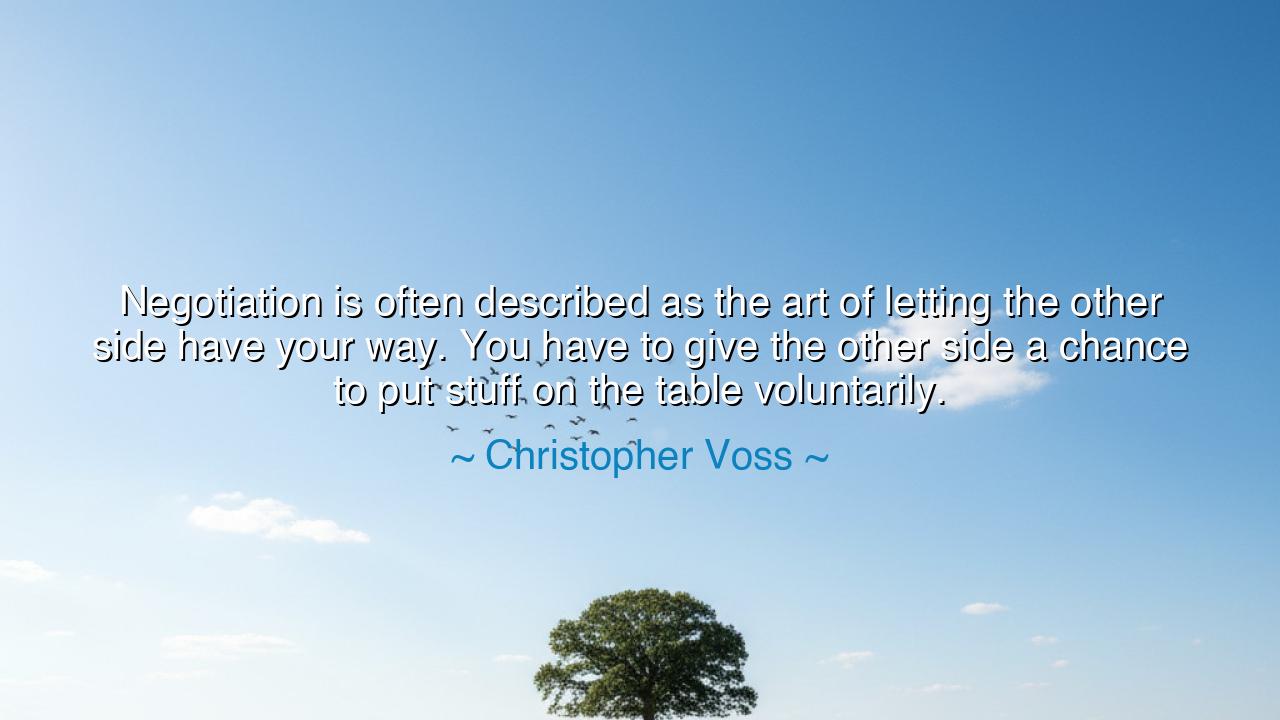
Negotiation is often described as the art of letting the other
Negotiation is often described as the art of letting the other side have your way. You have to give the other side a chance to put stuff on the table voluntarily.






"Negotiation is often described as the art of letting the other side have your way. You have to give the other side a chance to put stuff on the table voluntarily." These profound words from Christopher Voss, a former FBI hostage negotiator, encapsulate a timeless principle of human interaction and strategy. At the heart of this quote lies a paradox: true negotiation is not about forceful domination or manipulation, but about subtle influence, and the art of letting the other party feel that they are in control, even as you steer the conversation toward your desired outcome. The wisdom of this approach has been recognized throughout history, where the greatest victories in conflict and diplomacy have often come not through direct confrontation, but through understanding and strategic patience.
In the ancient world, negotiation was often a matter of life and death. The Greeks and Romans understood that warfare was not the only path to power; the art of diplomacy was equally critical. Pericles, the great Athenian leader, was known for his ability to speak with eloquence and wisdom, persuading others not through force, but through the strength of his ideas and the art of persuasion. The Romans, too, recognized that in order to maintain control of their vast empire, they often had to win not only through the sword but through careful negotiation, alliances, and treaties. In the face of conflict, they would often offer their adversaries a chance to negotiate, ensuring that both sides felt they had a stake in the resolution, and thus securing a more stable peace.
One of the most vivid examples of such a strategic approach can be found in the story of King Philip II of Macedon, father of Alexander the Great. Philip, who would lay the foundation for his son's empire, was a master of diplomacy. Before launching his military campaigns, he would often employ a strategy of offering his enemies terms of peace that seemed generous, only to later move forward with his own agenda. By giving them the opportunity to “have their way,” as it were, he ensured that they felt included in the process, and were often too unwilling to challenge the terms later. It was through this strategic patience that Philip strengthened his position and was able to expand his influence without direct conflict, a strategy that Alexander would later adapt in his own conquests.
In a more recent context, Nelson Mandela embodies the spirit of Voss’s words. As a leader of the African National Congress and a key figure in ending apartheid in South Africa, Mandela understood the power of negotiation and compromise. When he began talks with the apartheid government, he did not demand everything at once; instead, he allowed his opponents to present their terms and negotiate from a position of strength. By giving the government a chance to act voluntarily, he showed the world that true leadership is not about forcing your will upon others, but about creating the conditions for peaceful resolution and understanding. His patience and wisdom in negotiation helped change the course of South African history.
The core lesson of Voss’s quote is that negotiation is not about being domineering or seeking to win at all costs. Rather, it is about understanding the other party's needs, allowing them space to express their concerns, and guiding the conversation with patience and strategic influence. It is through this careful balance that the best outcomes are often achieved—not by demanding everything, but by making the other side feel that they are part of the process. This approach leads to agreements that are more durable and that benefit both parties, because they are built on a foundation of mutual respect and understanding.
Thus, the practical action we can take in our own lives is to approach every negotiation—whether in business, relationships, or personal endeavors—with the mindset of active listening and strategic patience. Instead of rushing to present our demands, we should first give others the space to voice their perspectives. By doing so, we allow them to feel heard and valued, which creates an environment of cooperation and compromise. In this way, we align ourselves with the wisdom of the ancients, recognizing that the true power of negotiation lies not in dominating the conversation, but in guiding it with wisdom and subtlety.
As we move forward, let us remember that the most successful negotiators are not the loudest voices in the room, but the ones who know when to step back and allow others to feel empowered. The art of negotiation is the art of leadership itself—of guiding others toward a resolution in which all parties feel they have contributed and gained. When we adopt this approach, we will find that mutual respect and understanding can turn even the most challenging negotiations into lasting partnerships. Thus, Voss’s words teach us not only how to negotiate, but how to be true leaders, capable of steering even the most complex situations toward harmony and success.






AAdministratorAdministrator
Welcome, honored guests. Please leave a comment, we will respond soon